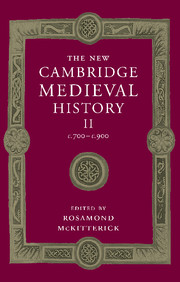Book contents
- Frontmatter
- PART I POLITICAL DEVELOPMENT
- 1 Introduction: sources and interpretation
- 2 The British Isles
- (a) England, 700–900
- (b) Ireland, Scotland and Wales, c. 700 to the early eleventh century
- (c) England and the Continent
- 3 Frankish Gaul to 814
- 4 The Frankish kingdoms, 814–898: the West
- 5 The Frankish Kingdoms, 817–911: the East and Middle Kingdoms
- 6 Fines Imperii: the Marches
- 7 The Vikings in Francia and Anglo-Saxon England to 911
- 8 Scandinavia, c. 700–1066
- 9 Slavs and Bulgars
- 10 The Muslims in Europe
- 11 Spain: the northern kingdoms and the Basques, 711–910
- 12 Lombard and Carolingian Italy
- 13 Byzantine Italy, c. 680–c. 876
- 14 Byzantium and the west, 700–900
- PART II GOVERNMENT AND INSTITUTIONS
- PART III CHURCH AND SOCIETY
- PART IV CULTURE AND INTELLECTUAL DEVELOPMENTS
- Conclusion
- Appendix genealogical tables
- List of primary sources
- Bibliography of secondary works arranged by chapter
- Index of manuscripts
- General index
- Frontispiece">
- Plate section
- Map 4 Charlemagne’s Europe and Byzantium, 814
- Map 19 The ecclesiastical provinces of western Europe 700-900
- Map 20 Carolingian schools, scriptoria and literary centres
- Genealogical table X: Wessex
- References
(a) - England, 700–900
from 2 - The British Isles
Published online by Cambridge University Press: 28 March 2008
- Frontmatter
- PART I POLITICAL DEVELOPMENT
- 1 Introduction: sources and interpretation
- 2 The British Isles
- (a) England, 700–900
- (b) Ireland, Scotland and Wales, c. 700 to the early eleventh century
- (c) England and the Continent
- 3 Frankish Gaul to 814
- 4 The Frankish kingdoms, 814–898: the West
- 5 The Frankish Kingdoms, 817–911: the East and Middle Kingdoms
- 6 Fines Imperii: the Marches
- 7 The Vikings in Francia and Anglo-Saxon England to 911
- 8 Scandinavia, c. 700–1066
- 9 Slavs and Bulgars
- 10 The Muslims in Europe
- 11 Spain: the northern kingdoms and the Basques, 711–910
- 12 Lombard and Carolingian Italy
- 13 Byzantine Italy, c. 680–c. 876
- 14 Byzantium and the west, 700–900
- PART II GOVERNMENT AND INSTITUTIONS
- PART III CHURCH AND SOCIETY
- PART IV CULTURE AND INTELLECTUAL DEVELOPMENTS
- Conclusion
- Appendix genealogical tables
- List of primary sources
- Bibliography of secondary works arranged by chapter
- Index of manuscripts
- General index
- Frontispiece">
- Plate section
- Map 4 Charlemagne’s Europe and Byzantium, 814
- Map 19 The ecclesiastical provinces of western Europe 700-900
- Map 20 Carolingian schools, scriptoria and literary centres
- Genealogical table X: Wessex
- References
Summary
in his Historia Ecclesiastka Gentis Anglorum, written c. 730, Bede expounded a vision of English history which was intended to instruct his contemporaries ‘in their various kingdoms’, and which has always exerted a powerful influence on those who would follow in his path. The ‘race of the Angles or Saxons’ had sprung from different Germanic tribes in northern Europe, but they shared a common language and had come to be united in their adherence to the Christian faith; so that while Bede recognised a distinction between the people of Kent, the East Saxons, the South Saxons, the West Saxons, the East Angles, the Middle Angles, the Mercians and the Northumbrians (HE 1. 15), he also perceived them collectively as the ‘English people’, and his history as that ‘of our nation’ (HE, Preface). Bede’s conception of the collective identity of the English people is a good example of the way in which he could distance himself, for his particular didactic purposes, from the real world of personal ambition, political aspiration, social pressure and material greed: it was a convenient and effective way of presenting his message to a wide audience but, in any political sense, it was a long way ahead of its time. One need not suppose, however, that Bede was an early advocate of the unification of ‘England’, as if unification on such terms was something already considered to be desirable for its own sake, and as if Bede had been concerned to set a programme for succeeding generations
- Type
- Chapter
- Information
- The New Cambridge Medieval History , pp. 18 - 42Publisher: Cambridge University PressPrint publication year: 1995
References
- 4
- Cited by

